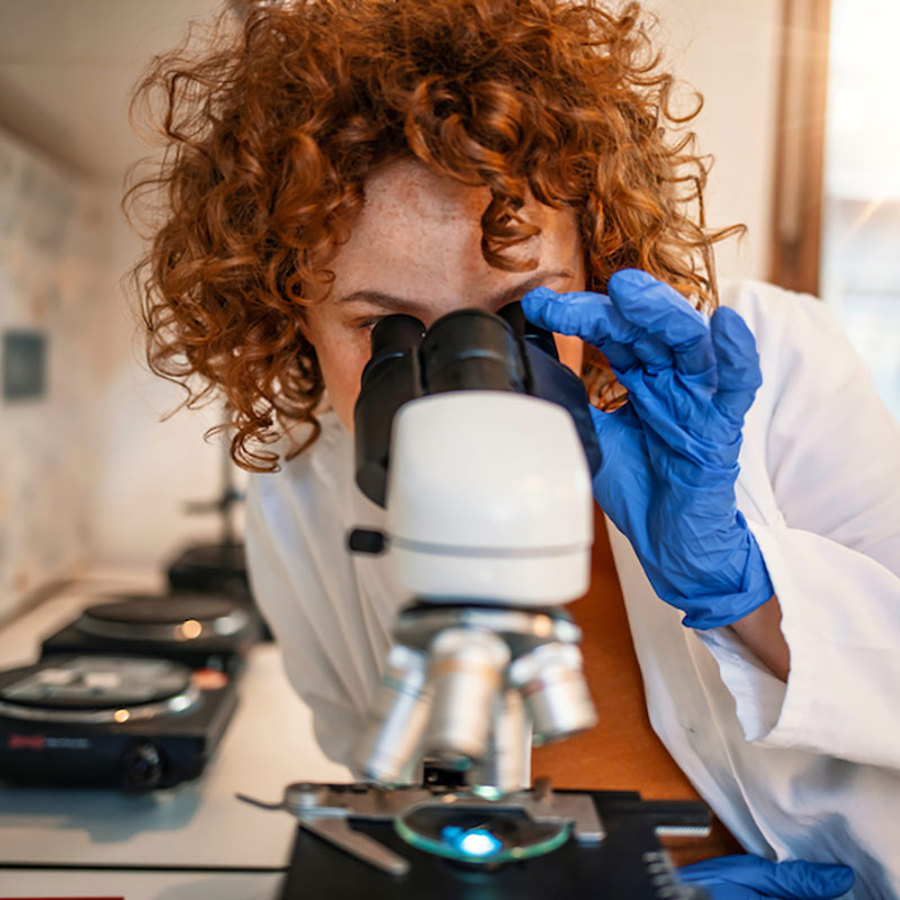
Is there a link between red hair and Rh negative blood?
October 15, 2004

- Related Topics:
- DNA basics,
- Transcription and translation,
- Noncoding DNA
A curious adult from Maryland asks:
“I am a redhead and I have Rh negative blood. Is there any genetic correlation between the two? Also, what is the difference between Rh negative and Rh positive blood types? Thanks!”
Lots of traits seem to come in pairs, like blonde hair and blue eyes or red hair and freckles. In this case however, your red hair and your Rh-negative status are just a coincidence, not a case of genetic correlation.
So why do blonde hair and blue eyes but not red hair and Rh factor usually come together? Blonde hair and blue eyes are often found together in people because the genes for each trait are close together on the same chromosome.*
As you know, people have 2 copies of each chromosome – one from their mom and one from their dad. The chromosome you inherit from your mother is a combination of both of her copies of that chromosome, not just one of the original two she got from her parents. Nature has come up with this system to make everyone as different as possible.
How does this system work? When eggs and sperm are made, blocks of DNA are moved between the two chromosomes of a pair in a process called recombination. If two genes are on the same chromosome and very close to each other, they have a good chance of being moved together as a block and getting passed on to you as a single unit.
So where are the genes for red hair and Rh factor? The gene for red hair, MC1R, is found on chromosome 16. The gene for Rh factor is found on chromosome 1. Since the two genes are on different chromosomes, they can’t be linked together.

Rhesus factor
Besides wanting to know if Rh status and red hair are linked, you also wanted to know a bit about Rh factor. Rh is short for Rhesus, which is a kind of monkey. Years ago scientists found that there was a protein on some people’s blood cells that was the same as a protein found on the blood cells of Rhesus monkeys, and that's how it got the name “Rh factor”.
You’ll notice I said some people’s blood. There are also people who don’t have the Rh factor on their blood cells. These people, like you, are called Rh-negative.
No one knows what the Rh factor does, but we do know that it doesn’t have any effect on your health. For almost all purposes, Rh-negative and -positive people are no different from each other. The only time the Rh factor status of a person is important is when a woman is pregnant.
If a mother is Rh negative and she is having a baby that got the Rh gene from the father, then there could be problems for the baby. But why?

Sometimes for a variety of harmless reasons, a baby’s blood cells can get into the mother's bloodstream. The mother’s body sees the Rh factor on the blood cells of the baby as an attacker. This causes the mother's body to make antibodies against Rh factor.
Normally antibodies are made to destroy foreign attackers like bacteria and viruses. Sometimes though, the body makes antibodies against things we wish it wouldn’t. When a mom’s body makes antibodies against the Rh protein, the antibodies can pass through the umbilical cord to the baby and attack the baby’s blood cells, causing potentially serious health problems.
This problem of antibodies attacking the baby’s blood cells can only happen in an Rh-negative mother. An Rh-positive mother’s body doesn’t care if the baby is Rh-positive or negative, and there is no antibody attack. A simple blood test can tell if you are Rh negative or positive. If a pregnant woman is found to be Rh-negative, her doctor has several treatments that can prevent her body from attacking the baby’s blood cells and everything should turn out fine.
So there you have it! There’s no genetic correlation between your red hair and your Rh-negative blood. You asked a great question about two very interesting traits, but that’s all they have in common ... you!
*Editor’s note (6/02/2021):This article states that the genes for blond hair and blue eyes are located close to each other on the same chromosome. This information is outdated; we now know that there are many genes that contribute to both blond hair and blue eyes, not all of which are linked.

Author: Erin Cline
When this answer was published in 2004, Erin was a Ph.D. candidate in the Department of Molecular and Cellular Physiology, studying epithelial cell polarity and protein localization in James Nelson’s laboratory. Erin wrote this answer while participating in the Stanford at The Tech program.
 Skip Navigation
Skip Navigation
